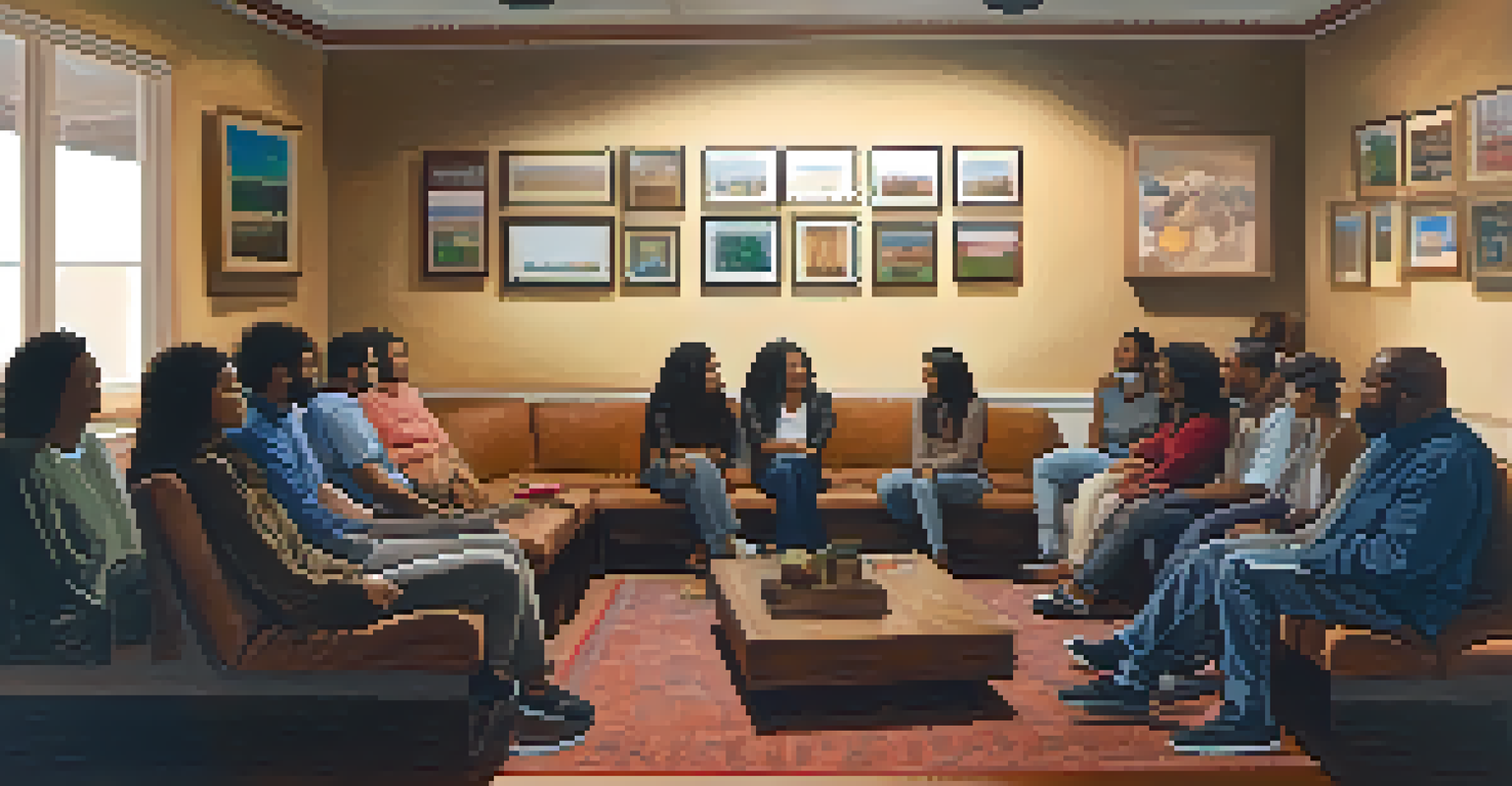Exploring the Role of Faith-Based Organizations in Equity

Understanding the Role of Faith-Based Organizations
Faith-based organizations (FBOs) serve as crucial pillars in many communities, often bridging gaps where government services may fall short. They are typically founded on shared beliefs and values, which provide a strong motivation for community service and outreach. By harnessing the collective power of their members, these organizations can mobilize resources and volunteers quickly to address pressing societal issues.
Faith is taking the first step even when you don't see the whole staircase.
These organizations often focus on social justice issues, advocating for the marginalized and underserved populations. Their commitment to the teachings of their faith often drives them to work towards equity, ensuring that everyone has access to the same opportunities and resources. This unique position allows FBOs to foster a sense of belonging and communal responsibility, essential elements in creating equitable societies.
Moreover, FBOs often collaborate with local governments and other nonprofits, amplifying their impact. This partnership can lead to more comprehensive solutions that address the root causes of inequity. By pooling resources and knowledge, these collaborations can create sustainable changes and encourage community engagement.
The Importance of Community Engagement
Community engagement is at the heart of FBOs' missions, as they seek to understand and address the specific needs of their communities. By actively involving community members in decision-making processes, these organizations ensure that their initiatives resonate with those they aim to help. This participatory approach fosters trust and strengthens relationships, making it easier for FBOs to implement their programs effectively.

FBOs often conduct outreach programs that encourage dialogue and understanding among diverse community members. This creates a platform for sharing experiences and perspectives, ultimately leading to a more cohesive community. When people feel heard and valued, they are more likely to participate in equity-focused initiatives.
FBOs Bridge Community Gaps
Faith-based organizations fill crucial service gaps in communities, mobilizing resources quickly to address pressing societal issues.
Additionally, FBOs frequently leverage their networks to mobilize community resources, such as volunteers and donations. This grassroots effort not only enriches the local economy but also empowers individuals to contribute to the betterment of their community. Engaged communities are more resilient, fostering a culture of support and cooperation.
Addressing Systemic Inequities Through Advocacy
FBOs play a significant role in addressing systemic inequities by advocating for policy changes and social justice. Many organizations leverage their moral authority to speak out against injustices, pushing for reforms that benefit marginalized communities. This advocacy is often rooted in their core beliefs, prompting them to stand up for the voiceless and challenge the status quo.
The best way to find yourself is to lose yourself in the service of others.
Through educational programs and awareness campaigns, FBOs inform their communities about the implications of systemic inequities. By empowering individuals with knowledge, they encourage them to take action and advocate for their rights. This grassroots mobilization is essential for driving long-term change in societal structures that perpetuate inequality.
Moreover, FBOs often collaborate with other advocacy groups, creating a united front against injustices. By joining forces, they can amplify their voices and influence policymakers more effectively. This collective approach not only raises awareness but also helps to foster a sense of solidarity among diverse groups.
Creating Safe Spaces for Marginalized Groups
One of the key contributions of FBOs is the creation of safe spaces for marginalized groups, where they can find support and community. These spaces often serve as havens for individuals facing discrimination, offering them a sense of belonging and acceptance. Through various programs, FBOs provide essential services such as counseling, education, and health resources tailored to the unique needs of these communities.
In these safe environments, individuals can share their experiences without fear of judgment, fostering healing and empowerment. This supportive atmosphere helps individuals build resilience and find their voice, enabling them to advocate for themselves and their communities. It’s a transformative process that can lead to increased confidence and agency.
Community Engagement is Key
Active community involvement in decision-making processes fosters trust and ensures FBO initiatives effectively meet local needs.
Additionally, FBOs often facilitate connections among marginalized individuals, creating networks of support that extend beyond their programs. These connections can open doors to new opportunities, such as employment or educational resources. By nurturing these relationships, FBOs contribute to a more equitable landscape, where everyone has the chance to thrive.
Fostering Interfaith Collaborations for Equity
Fostering interfaith collaborations is another vital aspect of how FBOs promote equity. By bringing together individuals from different faith backgrounds, these organizations can tackle common social issues collectively. This collaboration not only strengthens community bonds but also promotes understanding and respect among diverse groups.
Interfaith initiatives often lead to innovative solutions that address equity in a holistic manner. For instance, by pooling resources and sharing best practices, faith groups can launch joint programs that cater to various community needs, such as food security or education. This synergy amplifies their impact and showcases the power of unity in diversity.
Moreover, interfaith collaborations can help break down stereotypes and misconceptions that often lead to division. By working together towards common goals, individuals learn to appreciate each other's perspectives and experiences. This collective effort fosters a more inclusive community, creating a foundation for lasting equity.
Leveraging Technology for Community Outreach
In today’s digital age, FBOs are increasingly leveraging technology to enhance their outreach efforts. From social media campaigns to virtual support groups, technology enables these organizations to connect with a broader audience and engage community members in new ways. This adaptability is crucial for keeping pace with the evolving needs of communities.
Online platforms allow FBOs to disseminate information quickly, making it easier for individuals to access resources and services. For instance, many organizations offer virtual workshops and webinars on various topics, such as health, financial literacy, and advocacy training. This accessibility helps empower community members with the knowledge and skills needed to navigate challenges.
Advocacy for Systemic Change
FBOs leverage their moral authority to advocate for policy changes and social justice, empowering marginalized communities to voice their needs.
Additionally, technology facilitates collaboration among FBOs, enabling them to share resources and coordinate efforts effectively. By using digital tools for communication and planning, organizations can work together seamlessly, enhancing their collective impact. This interconnectedness is vital for creating a comprehensive approach to equity.
Measuring Impact: Success Stories and Challenges
Measuring the impact of FBOs in promoting equity can be challenging yet essential for understanding their effectiveness. Success stories often highlight the transformative effects of their programs, showcasing how they have improved the lives of individuals and communities. However, quantifying these outcomes can be complex, as the benefits may not always be immediately visible.
For example, an FBO may run a mentorship program that helps youth develop leadership skills. While the immediate outcomes may include increased participation in community events, the long-term impact—such as improved educational attainment—may take years to manifest. This delayed gratification can make it difficult to gauge success in real-time.

Despite these challenges, many FBOs are developing innovative ways to measure their impact. By using surveys, community feedback, and data analysis, they can better understand the needs of their constituents and adjust their programs accordingly. Continuous evaluation not only enhances their effectiveness but also demonstrates accountability to their supporters and communities.